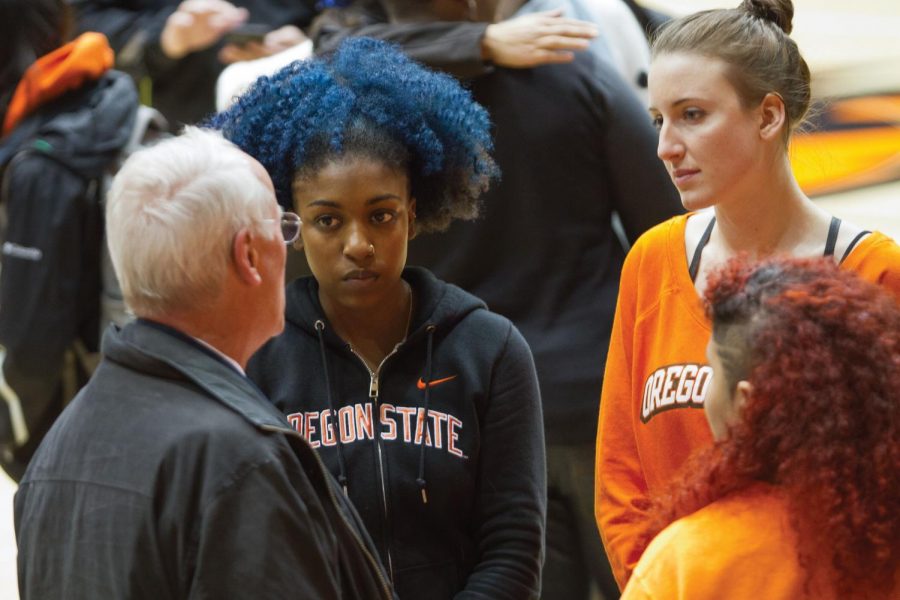Speak Out: proposals for change
November 30, 2015
In a meeting about racism on campus, student organizers of Speak Out and faculty followed up on the event to discuss the institutional changes Oregon State University needs to make to have a more inclusive campus.
The Speak Out drew a crowd of hundreds of students and community members to Gill Coliseum on Nov 16, inspiring several departments to write open letters of support for OSU’s students of color, pledging solidarity to combat racism within the university.
Many of these departments were represented at the follow-up meeting with Ray and the three students who organized the event: Jasmine Armas, Jesseanne Pope, and Haniya Ferrell.
Following the meeting, Pope said that the administration present at the meeting showed a great deal of support.
“They were very open to listening to us and to seeing what ideas we had,” Pope said. “I really felt like they genuinely wanted to listen to us and to make sure that from here on out there’s student voices and student representation in these kinds of things.”
The three organizers said Ray acknowledged at their meeting that his vision of equity and equal opportunity at Oregon State, created in 2011, has thus far failed OSU’s students of color.
Ferrell said Ray was understanding throughout the meeting and was not afraid to discuss his own position within systems of power.
“He touched on privilege definitely, and is aware that people of color go through a lot of stuff every single day that he doesn’t have to go through because he is a white man,” Ferrell said.
Pope said she suggested to Ray and administration the possibility of working with the university’s admissions and new student orientations to be sure that all incoming students have a clear sense of the expectations for the OSU community.
“Ed Ray and other folks in the room talked a lot about making sure students know before they come here what it means to be a part of this community,” Pope said. “They don’t feel that it’s been made clear what kind of community we have here.”
The three organizers said the university’s next steps thus far include looking into making student seats available on equity committees to increase student involvement in social justice related issues and to require social justice training and education for all students and faculty.
The university is also taking a look at transcripts of the racist comments and threats made in the online chat during the livestream of the speak out event, and attempting to determine who was behind them.
According to Ferrell, Ray said he intends to hold more frequent open-dialogue townhall meetings in the future to address inclusivity.
In the aftermath of the Speak Out, the three organizers said that the most important result is that students are talking about racism on campus, whether in solidarity with students of color, or in opposition.
In her position as a white student who helped to organize the speak out, Pope said she is continuing to work with other white students who have reached out to her since the event. She hopes to help white students at OSU to examine their identities and privileges and to also answer questions they have about the necessity of the speak out event.
“There are a lot of white students who have good intentions but don’t understand how oppression works enough to know that it’s not the responsibility of students of color to educate them about their issues and their own privilege,” Pope said.
This has led the three organizers to push for more frequent, and larger social justice retreats like the Racial Aikido and Examining White Identity retreats put on annually by the department of Diversity and Cultural Engagement at OSU.
Armas, as a member of Greek life, has talked with leaders in Greek organizations to debrief their thoughts following the Speak Out, and to clarify what inclusivity in the community should look like.
Ferrell says that following last Monday’s meeting with Ray, she hopes to see progressive change in the future of OSU.
“I know that this probably isn’t the first time this has happened, and when it’s happened before it’s the same old stuff. I am really hoping that it’s not like that this time,” Ferrell said.
Ferrell, Armas and Pope, along with many other students, are awaiting the administration’s next moves, hoping that action will be taken.
“These words that you have on your paper don’t really mean anything if they’re not being reflected in your community,” Armas said.
























































































































